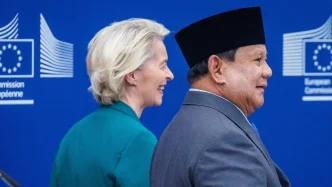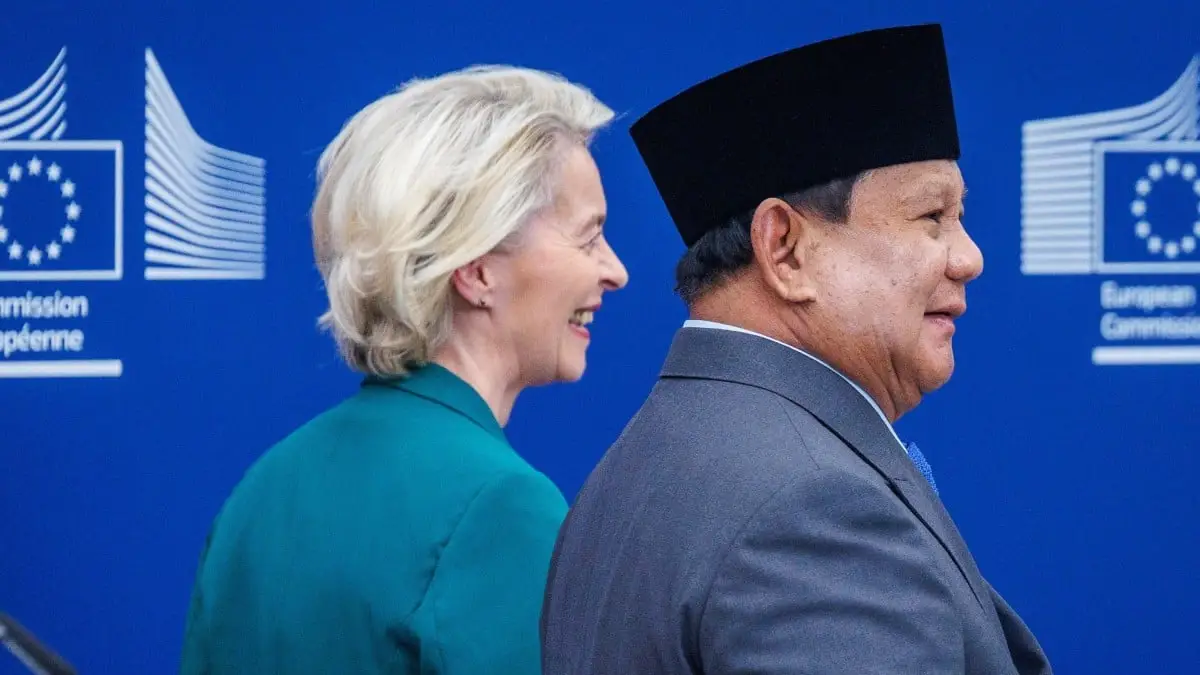Indonesia is on the cusp of a transformative economic partnership with the European Union, as President Prabowo Subianto arrived in Brussels over the weekend to finalize the Indonesia-European Union Comprehensive Economic Partnership Agreement (IEU-CEPA). This ambitious trade deal, poised for signing later in 2025, marks a significant milestone for Jakarta in navigating an increasingly volatile global trade landscape, exacerbated by rising tensions with the United States over protectionist tariff threats.
A Milestone in Uncertain Times
The IEU-CEPA, which spans 21 areas of cooperation including trade in goods and services, investment, customs procedures, digital trade, and sustainable growth, is expected to reshape Indonesia’s economic orientation. With substantive negotiations now concluded, both sides are preparing for the formal signing in Jakarta in the third quarter of 2025. Coordinating Economic Minister Airlangga Hartarto, speaking from Brussels, described the agreement as a pivotal achievement. “This is certainly a milestone amid the uncertainty between Indonesia and the EU. Our products can now enter Europe at zero tariffs” he told reporters in a video interview released on July 14, 2025.
The deal comes at a critical juncture. As global geopolitics shift—likely a reference to Washington’s looming tariff hikes of 20 to 40 percent on Southeast Asian countries—Europe has emerged as a more attractive and stable market for Indonesian exports. Airlangga emphasized that the EU’s import market, valued at approximately US$6.6 trillion globally, dwarfs the US market at US$3.3 trillion, presenting a significant opportunity for Indonesia to diversify its trade partners. Bilateral trade between Indonesia and the EU, already at US$30.1 billion in 2024, is projected to surge by up to 50 percent once the agreement is ratified, driven by reduced tariffs and non-tariff barriers.
Key Sectors and Strategic Gains
The IEU-CEPA is set to benefit key Indonesian sectors such as textiles, garments, and fishery products through lowered trade barriers. Additionally, it is expected to attract substantial European investment in high-growth industries like electric vehicles, semiconductors, renewable energy, and palm oil processing. This alignment with EU partners is already underway, with Indonesian businesses preparing supply chains ahead of the agreement’s anticipated entry into force, though full ratification may not occur until 2027.
One of the most contentious issues during negotiations—the EU’s deforestation regulation (EUDR)—has seen progress. The EU recently reclassified Indonesia as a “standard-risk” country under the EUDR, a move that eases restrictions on palm oil exports, a critical commodity for Indonesia as the world’s largest producer and exporter. Trade Minister Budi Santoso, accompanying the delegation in Brussels, noted that the EU had softened its stance on such regulations as the IEU-CEPA neared completion. “They too want to work with us going forward,” he said in a video interview on July 14, 2025.
Beyond immediate trade benefits, the agreement strengthens Indonesia’s position as a strategic partner for Brussels. Airlangga highlighted Indonesia’s bid to join the Organisation for Economic Co-operation and Development (OECD) as a factor in the EU viewing Jakarta as a “like-minded” ally. This partnership positions Indonesia as a frontrunner among ASEAN nations in forging deeper ties with Europe, ahead of regional peers like Malaysia and Thailand, who are also eyeing similar agreements.
Navigating US Tariff Threats
The backdrop to Indonesia’s pivot toward Europe is the escalating trade friction with the United States. Washington’s proposed tariffs have prompted ASEAN economies to seek alternative markets and bolster domestic supply chains. Of the 10 ASEAN member states, only Vietnam has secured a deal with the US to mitigate these tariff threats. In contrast, Indonesia has negotiated a temporary reprieve, with Airlangga revealing that the US agreed to a three-week “pause” on imposing tariffs to finalize discussions. This breathing room allows Jakarta to focus on cementing its European partnership while addressing American concerns.
The US has attempted to reassure Southeast Asian nations, with Secretary of State Mark Rubio reportedly stating that many countries in the region would face tariff rates more favorable than those in other parts of the world. However, for Indonesia, the allure of the EU market—coupled with the stability and scale it offers—appears to outweigh short-term assurances from Washington.
Diplomatic Engagements in Brussels
President Prabowo’s visit to Brussels, which officially began on July 14, 2025, underscores the importance of the IEU-CEPA to Indonesia’s long-term economic strategy. His itinerary includes high-level meetings with European Commission President Ursula von der Leyen and European Council President António Costa, as well as an audience with King Philippe of Belgium. These engagements signal not only a commitment to the trade pact but also a broader intent to deepen diplomatic and economic ties with Europe.
The timing of the visit, just weeks after the EU’s reclassification of Indonesia under the EUDR, highlights the momentum behind the agreement. For Jakarta, securing zero-tariff access to the EU market is a tangible win, particularly for commodities like palm oil, which have faced stringent environmental regulations in recent years. The resolution of such sticking points during negotiations reflects a mutual desire to advance cooperation, even as global trade dynamics grow more complex.
Regional Implications and ASEAN Dynamics
Indonesia’s leadership in securing the IEU-CEPA positions it as a trailblazer within ASEAN. Airlangga noted that other member states are observing Jakarta’s progress, with countries like Malaysia and Thailand potentially following suit. This regional competition underscores the urgency for Southeast Asian economies to diversify their trade portfolios amid uncertainty from traditional partners like the US. For Indonesia, being the “front-runner” in forging deeper cooperation with Europe could yield first-mover advantages, particularly in attracting investment and establishing supply chain dominance in key sectors.
Within ASEAN, the broader context of trade diversification is evident. The region’s economies are increasingly looking beyond traditional markets to mitigate risks from protectionist policies. While Vietnam’s agreement with the US offers a temporary shield against tariffs, other nations, including Indonesia, are prioritizing partnerships that offer long-term stability. The EU, with its vast market and commitment to sustainable trade practices, represents a viable alternative for ASEAN’s export-driven economies.
Challenges Ahead: Ratification and Implementation
Despite the optimism surrounding the IEU-CEPA, challenges remain. Full ratification of the agreement is not expected before 2027, creating a window of uncertainty for businesses eager to capitalize on reduced tariffs. During this interim period, Indonesian and European stakeholders will need to align regulatory frameworks and prepare for the operational intricacies of the pact. For sectors like palm oil, ongoing compliance with EU environmental standards will be critical to maintaining market access.
Moreover, the global trade environment remains fluid. While the US tariff pause offers temporary relief, the outcome of Indonesia’s negotiations with Washington could influence the broader economic landscape. A failure to secure favorable terms with the US might further accelerate Jakarta’s pivot to Europe, but it could also strain resources as the country balances multiple trade fronts. The interplay between these dynamics will shape the implementation of the IEU-CEPA in the coming years.
Looking Forward: A New Trade Horizon
As President Prabowo and his delegation conclude their engagements in Brussels, the IEU-CEPA stands as a testament to Indonesia’s proactive approach to global trade challenges. The agreement not only promises economic benefits through increased exports and investment but also cements Jakarta’s role as a strategic partner for the EU in Southeast Asia. Yet, the path to full implementation is fraught with complexities, from ratification delays to navigating geopolitical headwinds.
For now, the focus remains on the formal signing later in 2025, a moment that could redefine Indonesia’s trade trajectory. As global uncertainties persist, the question looms: will this historic pact with Europe provide the stability Indonesia seeks, or will it merely be one piece of a much larger puzzle in an unpredictable world?















